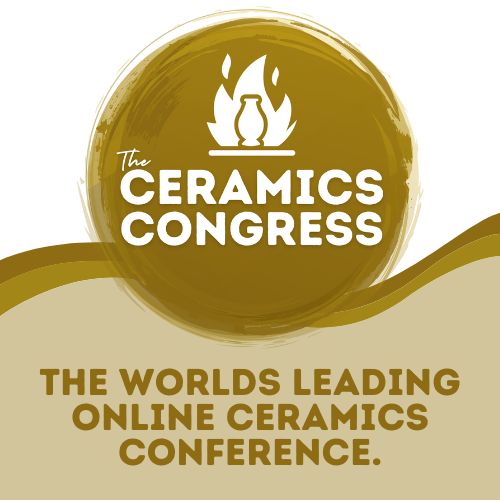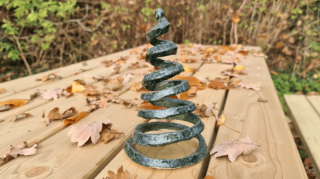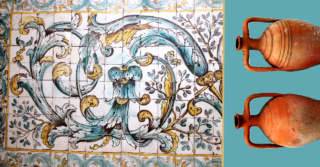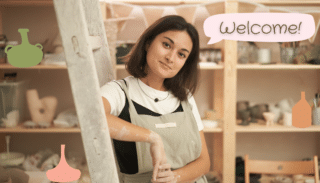If you’ve come across some beautifully cast ceramics recently and are interested in getting started in this precision-based process yourself, you’re in for a treat. In this comprehensive guide, we’ll unveil 12 essential tools that are bound to enhance your experience in slip casting and mold making. Whether you’re a seasoned ceramicist seeking to expand your skills or a curious beginner eager to learn, we’ve got you covered. So, don your apron, roll up your sleeves, and let’s embark on a thrilling journey into the world of slip casting and plaster mold making together!
Weigh Scale

scale-fec-series-6000-x-0-1g-2040
If you’ve dabbled a bit in plaster casting, you’ve already learned that there’s a bit of measuring involved. Since plaster has a set work time, you need to mix up only as much as you can use, and for that you’ll need an accurate scale. For greatest versatility we recommend getting one that measures to 0.1g, and has a capacity of 300g or more, depending on the size of molds you plan to make. Look for models that are easy to clean, and that come with a bubble level for more accurate measurements.
Cottles

Frame/m-1068.aspx
Cottles are the frame that contains your plaster while mold making, and are an absolute must. Adjustable wooden cottles are incredibly handy, as you can arrange them to fit perfectly around each individual piece, reducing the use of excess plaster. The style pictured here can be purchased ready-made, or you can make them yourself with a bit of wood, screws, and a few truss clips. You can also use a wall of clay for your cottles, just remember that this clay cannot be mixed with clean clay afterwards or fired in your kiln. If this is your preferred method, consider having some clay in your studio that is exclusively for this purpose, such as your reclaim.
Releasing Agent

murphy-oil-soap-liquid-32oz-910ml-x-9.html
Once you’re marked out your model to avoid all undercuts, your next step to guaranteeing your plaster will easily come away from your form by coating it with a releasing agent. Murphy’s Oil Soap is a long held favorite, but you can also use liquid dish detergent, or cooking spray. Simply brush or spray on a couple of coats, being sure to cover all areas that your plaster will be touching, including your work surface and cottles.
Thick Rubber Bands

asp?gid=10&cid=176&scid=477
If you are making molds that are 2 parts or more, then rubber bands are your best friends. Look for ones that are heavy-duty and can hold your mold parts firmly together without any risk of snapping or shifting. This will guarantee your mold stays tightly in place while you pour your slip in and back out again. Remember that rubber bands degrade over time, especially with exposure to light and air, so store in a dark sealed container. Be sure to have some extras on hand as well, as you don’t want to be caught out if one happens to break mid-pour!
Fettling Knife

made-handled-potters-knife-potk-3/p2287
A must have for every slip caster, the humble fettling knife will help you clean up all of your seams after your piece has been cast. There are a variety of styles available, so find one that fits comfortably in your hand and that can be easily sharpened. And of course, feel free to use this versatile tool elsewhere in your studio. It’s great for cutting slabs and coils too!
Dowels or Grate

hardwood-dowel-36-long-pack-of-20-dowels/5060969522314_BQ.prd
After you’ve poured your slip out of your mold, it’s time to let your casting rest. To do this, you’ll need to leave your mold inverted. This is where dowels or grates come in handy. By placing your mold top-down on several dowels or a cooling rack, you raise it slightly off your work surface, giving space for any excess slip to drip out while allowing air to get in to help the clay set. To aid with clean-up, place a catch-tray underneath to contain any slip.
Plaster Rasp

No matter how meticulous we are in our casting, it’s likely that our molds will require a bit of clean up afterwards, most commonly around the edges. While you may think that this is only an aesthetic issue that can be overlooked, having uneven edges on your molds can make them uncomfortable to hold, and more importantly: it risks plaster chipping off with handling, which can contaminate your clay. Plaster rasps are an affordable tool that make cleaning up your mold a breeze. With just a bit of effort your molds will be beautifully smooth, and a delight to work with!
Graduated Pitcher/Beaker

tools/mixing-measuring-tools/beaker
As we’ve already discussed, plaster mixing requires a bit of measuring. While you’ll need your scale to weigh out your solids, a graduated pitcher is invaluable for measuring out your water. It’s a simple and affordable tool, but one you quickly won’t want to be without.
Glass

-cut-to-size-per-metre-sq
Glass panes provide a beautifully smooth and non-porous surface that’s great for working from. They’re especially great as a base for your sprig mold models as they’ll give a perfectly flat top to your mold. They are perfect for making plaster slabs for your studio for the same reason. Be sure to get sheets with smoothed edges for safer handling, and remember to coat with your mold release before you start pouring!
Funnel

products/6-plastic-funnel
Another simple and affordable tool, funnels are great to have on hand for those molds that have a narrower opening. By allowing a more accurate pour, you’ll have less mess and less waste, so what’s not to love?
Gypsum Scrapers

-mold/4m-set-of-gypsum-scrapers
These tools are for those of you who want to modify your mold after making, or for those who want to make their models from plaster as well. Coming in a variety of shapes, they’ll allow you to carve plaster with precision, adding new details or cleaning up unwanted blemishes. Look for models that can be resharpened, and that feel comfortable in your hand.
Plaster Lathe

Once you’ve really caught the casting bug, you may want to make custom models from plaster, rather than relying on found objects or clay forms. A plaster lathe will help you do just that! Working similarly to a wood lathe, a plaster lathe allows you to create cylindrical forms from solid blocks of plaster. It’s a bigger investment, but if you are serious about design and production, this tool can be a game-changer.
As we reach the end of our exploration into the world of slip casting and plaster mold making tools, we hope you’ve found this guide both informative and inspiring. These 12 tools we’ve uncovered are sure to become your trusted allies on your ceramic journey. Whether you’re experimenting with slip casting for the first time or honing your mold-making skills, having the right tools can make a difference in the quality and creativity of your work. Remember, as with any art form, practice and patience are key to mastering these techniques. So, don’t be afraid to get your hands dirty, take risks, and embrace the beauty of imperfections in your creations. Armed with these tools and your artistic passion, the possibilities are endless!
To get your slip casting off on the right foot, be sure to sign up for Jean White’s fantastic workshop “Low Tech Plaster and Slip Casting for the Home Studio”. She’ll show you everything you need to know, from designing sprig molds, creating a wet box, and setting up your home studio for the optimum casting experience!






Responses